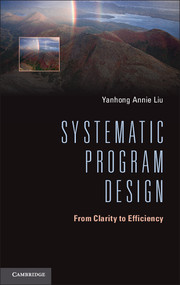4 - Recursion: iterate and incrementalize
Published online by Cambridge University Press: 05 June 2013
Summary
Many combinatorics and optimization problems can be solved straightforwardly by combining solutions to subproblems, where the subproblems may overlap in complicated manners. Such ways of solving the problems can be easily specified using recursive functions—functions whose definitions involve calls to the functions themselves, called recursive calls. The recursive calls are used for solving subproblems. Applications include many kinds of data analysis and decision-making problems, such as the great many kinds of analysis and manipulations needed on sequences, be they sequences in biological computing, document processing, financial analysis, or sensor data analysis.
Straightforward evaluation of recursive functions may be inefficient, and may in fact be extremely inefficient when they are used to solve overlapping subproblems, because subproblems may share subsubproblems, and common subsubproblems may be solved repeatedly. An efficient algorithm solves every subsubproblem just once, saves the result appropriately, and reuses the result when the subsubproblem is encountered again. Such algorithms are called dynamic programming algorithms. To arrive at such efficient algorithms, we must determine how efficient computations should proceed, and how computed results should be saved and reused. These correspond to Steps Iterate and Incrementalize. Step Implement just determines a straightforward way of storing the saved results in appropriate data structures.
- Type
- Chapter
- Information
- Systematic Program DesignFrom Clarity to Efficiency, pp. 83 - 116Publisher: Cambridge University PressPrint publication year: 2013
- 1
- Cited by



